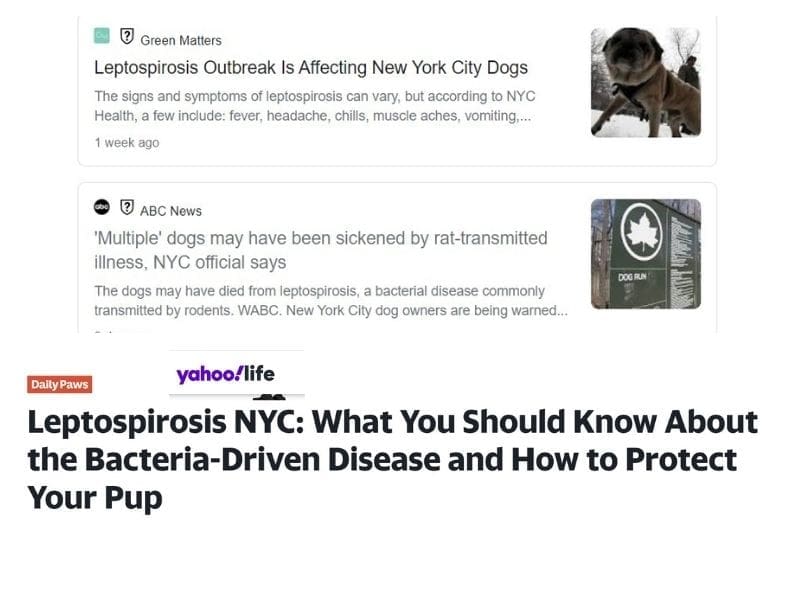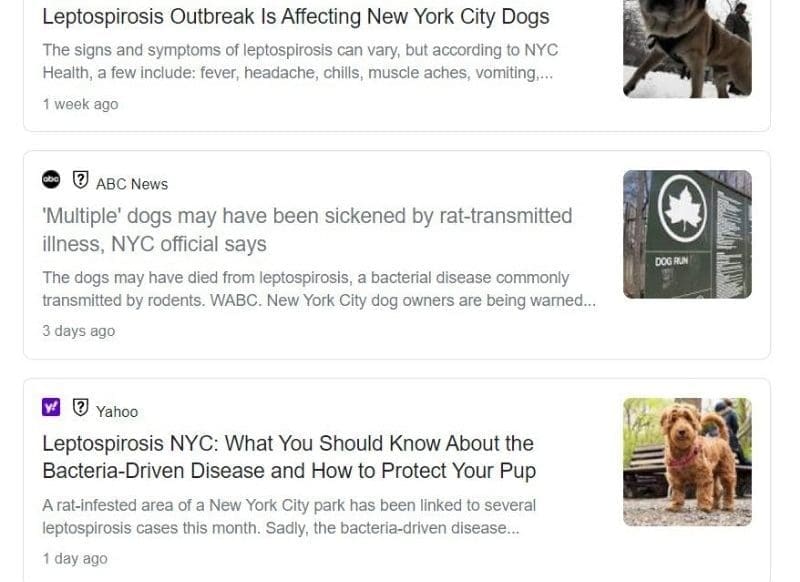Press feasts on dog ‘death by rat urine’ lepto rumors — but NYC Health Dept. spox says no cases reported
This report has been updated to include a statement we received around 6pm ET on January 26 from acting press secretary Michael Lanza at NYC’s Department of Health:
“The Health Department so far cannot confirm recent reports of canine leptospirosis related to McCarren Park. We have not received reports of leptospirosis in dogs from Brooklyn this year. The Health Department has reached out proactively to several veterinary hospitals in the area, none of which have seen cases so far this year.”
“‘Multiple’ dogs may have been sickened by rat-transmitted illness,” ABC affiliate WABC-TV reported Monday. However, in New York City, Health Department officials have not confirmed even one case involving the illness. And we’re not trying to pick on bloggers, but there’s a reason our only blogger is Nellie the Labrador: One blog declared a leptospirosis “outbreak” as early as last week, apparently scooping The Canine Review, and even The New York Times. In fact, the blogger’s source on “outbreak” is city councilman Lincoln Restler, who is not, in fact, on the payroll of any health department. “Leptospirosis NYC….” declared something called Daily Paws which, remarkably, appears to be syndicated by Yahoo.

So, it’s true that dogs are rumored to have died as a result of exposure to leptospirosis in McCarren Park in the Williamsburg section of Brooklyn. But it’s also true that as of January 26, New York City’s Health Department has not provided confirmation that any of the deaths were related to leptospirosis. The New York Times was responsible enough to begin its reporting by underscoring exactly that: “The city Health Department said it could not confirm the reports, but said that it was working with the Parks Department to inspect for rat activity in the park. Veterinarians are supposed to report positive cases of leptospirosis to the Health Department.”
In New York City, where the soaring rat population is infamous, it’s no surprise that local media outlets have taken liberties in their reporting of the rat-infestation-leptospirosis rumors surrounding the Brooklyn park to underscore the city’s rat population. Politicians, too, have taken such liberties: “As of yesterday, construction began at the McCarren Dog Run to improve health & safety conditions,” city councilmember Lincoln Restler tweeted January 25. “Efforts are underway to improve drainage, replace mulch & top soil with gravel, & exterminate the rat population using techniques safe for dogs,” he added.
Rat stories are guaranteed clickbait. Throw in ‘multiple dog deaths’ and you have a blockbuster. But this kind of “cart before the horse” animal health reporting is reminiscent of the media’s breathless reporting on America’s first Covid-positive dog–an interesting development, to be sure, except that nobody who ran with the “breaking news” that day bothered to call anyone at the U.S. Department of Agriculture, where Covid cases in animals are ultimately confirmed, usually after veterinarians report to state veterinarians, and simply ask if the USDA had confirmed the case in question. We did and, no, the USDA had not confirmed anything.
On Wednesday morning, we reached out to New York State veterinarian, Alexandra Newman, who directed us to New York City’s Department of Health. In New York City, canine leptospirosis cases must be reported to city health officials. Michael Lanza, NYC’s Dept. of Health press secretary provided the following statement:
The Health Department so far cannot confirm recent reports of canine leptospirosis related to McCarren Park. We have not received reports of leptospirosis in dogs from Brooklyn this year. The Health Department has reached out proactively to several veterinary hospitals in the area, none of which have seen cases so far this year.
Also, there’s a vaccine for that
There is, notably, a safe and effective vaccine for dogs. More on that later today. Meantime:
From Leptospirosis in Dogs – Generalized Conditions – Merck Veterinary Manual:
“Dogs are the primary host of Leptospira serovars, and many other mammal species can also be infected. Clinical signs range from mild, subclinical infection to multi-organ failure and death. Diagnosis includes serologic testing and identification of leptospires in tissues, blood or urine. Doxycycline is the primary drug used for treatment in dogs, along with appropriate supportive care. Polyvalent vaccines are available for prevention. Specific serovars in a geographic area vary, so vaccines with the appropriate types should be used. Leptospirosis in dogs, sometimes referred to by the short-hand, lepto in dogs, is an infectious disease caused by bacteria in the genus Leptospira….Commercial bacterins for dogs are available for serovars Canicola, Icterohaemorrhagiae, Grippotyphosa, and Pomona. Vaccinated dogs may potentially be susceptible to infection with other serovars, although this has not been tested in an experimental setting. In general, currently available vaccines provide good protection from clinical disease and also appear to reduce renal colonization and urine shedding. Concerns exist regarding hypersensitivity reactions after leptospiral vaccination in dogs, but these appear to be unjustified based on more recent studies and perhaps associated with the use of more highly purified vaccines.”

